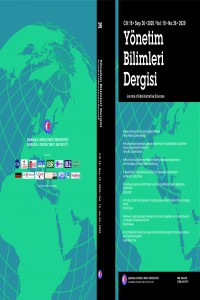Öz
In the competitive economic environment, cash flow statement reveals prominent information about firms. The aim of the present study is to examine the usefulness of cash flow statement in the prediction of business failure by using a sample including 66 firms listed on Borsa Istanbul from 2010 to 2018. A total of 33 non-failed firms are matched with 33 failed firms based on size and industry. In the present study, logistic regression models are constructed for each of three years prior to business failure. The empirical findings of this study indicate that cash flow measures are strong predictors of business failure.
Anahtar Kelimeler
Cash Flow Statement Cash Flow Management Business Failures Financial Reporting
Kaynakça
- Almamy, J., Aston, J., & Ngwa, L. N. (2016). An evaluation of Altman's Z-score using cash flow ratio to predict corporate failure amid the recent financial crisis: Evidence from the UK. Journal of Corporate Finance, 36, 278-285.
- Barua, S., & Saha, A. K. (2015). Traditional Ratios vs. Cash Flow based Ratios: Which One is Better Performance Indicator?. Advances in Economics and Business, 3(6), 232-251.
- Bhandari, S. B., & Iyer, R. (2013). Predicting business failure using cash flow statement based measures. Managerial Finance, 39(7), 667-676.
- Casey, C., & Bartczak, N. (1985). Using operating cash flow data to predict financial distress: Some extensions. Journal of Accounting Research, 23(1), 384-401.
- Celli, M. (2015). Can Z-Score Model Predict Listed Companies' Failures in Italy? An Empirical Test. International Journal of Business and Management, 10(3), 57.
- Charitou, A., Neophytou, E., & Charalambous, C. (2004). Predicting corporate failure: empirical evidence for the UK. European Accounting Review, 13(3), 465-497. Cultrera, L., & Brédart, X. (2016). Bankruptcy prediction: the case of Belgian SMEs. Review of Accounting and Finance, 15(1), 101-119.
- Gentry, J. A., Newbold, P., & Whitford, D. T. (1985). Classifying bankrupt firms with funds flow components. Journal of Accounting Research, 23(1), 146-160.
- Gupta, J., Wilson, N., Gregoriou, A., & Healy, J. (2014). The value of operating cash flow in modelling credit risk for SMEs. Applied Financial Economics, 24(9), 649-660.
- Güriş, S., Akay, E. Ç., Ün, T., & Kızılarslan, Ş. (2017). Multivariate Probit Modeli ile Finansal Başarısızlığın Yeniden İncelenmesi: Borsa İstanbul Örneği. Sosyal Bilimler Araştırma Dergisi, 6(3), 199-210.
- Jantadej, P. (2006). Using the combinations of cash flow components to predict financial distress. Unpublished PhD Thesis, The University of Nebraska-Lincoln.
- Jooste, L. (2006). Cash flow ratios as a yardstick for evaluating financial performance in African businesses. Managerial Finance, 32(7), 569-576.
- Krishnan, G. V., & Largay III, J. A. (2000). The predictive ability of direct method cash flow information. Journal of Business Finance & Accounting, 27(1‐2), 215-245.
- Mazouz, A., & Gambrel, P. A. (2013). The impact of cash flow on business failure analysis and prediction, International Journal of Social Sciences and Entrepreneurship, 1(3), 14-29.
- Muller, G. H., Steyn-Bruwer, B. W., & Hamman, W. D. (2009). Predicting financial distress of companies listed on the JSE-A comparison of techniques. South African Journal of Business Management, 40(1), 21-32.
- Ooghe, H., & De Prijcker, S. (2008). Failure processes and causes of company bankruptcy: a typology. Management Decision, 46(2), 223-242.
- Rujoub, M. A., Cook, D. M., & Hay, L. E. (1995). Using cash flow ratios to predict business failures. Journal of Managerial Issues, 7(1), 75-90.
- Kieso, D. E., Weygandt, J. J., Warfield, T. D., Young, N. M., Wiecek, I. M., & McConomy, B. J. (2013). Intermediate Accounting, Volume 2. Wiley Global Education.
- Raja, A., M. Nosworthy, and D. Goureia. (1980) "Diagnosis of Financial Health by Cash Flow Analysis." Working Paper, London Business School.
- Shamsudin, A., & Kamaluddin, A. (2015). Impending Bankruptcy: Examining cash flow pattern of distress and healthy firms. Procedia Economics and Finance, 31, 766-774.
- Stice, D., Stice, E., & Stice, J. (2017). Cash Flow Problems Can Kill Profitable Companies. International Journal of Business Administration, 8(6), 46-54.
- Ural K., Gürarda, Ş., & Önemli, M. B. (2015). Lojistik Regresyon Modeli ile Finansal Başarısızlık Tahminlemesi: Borsa İstanbul’da Faaliyet Gösteren Gıda, İçki ve Tütün Şirketlerinde Uygulama, Muhasebe ve Finansman Dergisi, 67, 85-100.
- Wagner Ricci, C. (2003). Bankruptcy prediction: the case of The CLECS. American Journal of Business, 18(1), 71-82.
- Ward, T. J., & Foster, B. P. (1997). A note on selecting a response measure for financial distress. Journal of Business Finance & Accounting, 24(6), 869-879.
- Zeytinoğlu, E., & Akarım, Y. D. (2013). Financial failure prediction using financial ratios: An empirical application on Istanbul Stock Exchange. Journal of Applied Finance and Banking, 3(3), 107-116.
Ayrıntılar
| Birincil Dil | İngilizce |
|---|---|
| Bölüm | Araştırma Makalesi |
| Yazarlar | |
| Yayımlanma Tarihi | 23 Mart 2020 |
| Gönderilme Tarihi | 15 Ekim 2019 |
| Yayımlandığı Sayı | Yıl 2020 Cilt: 18 Sayı: 36 |


